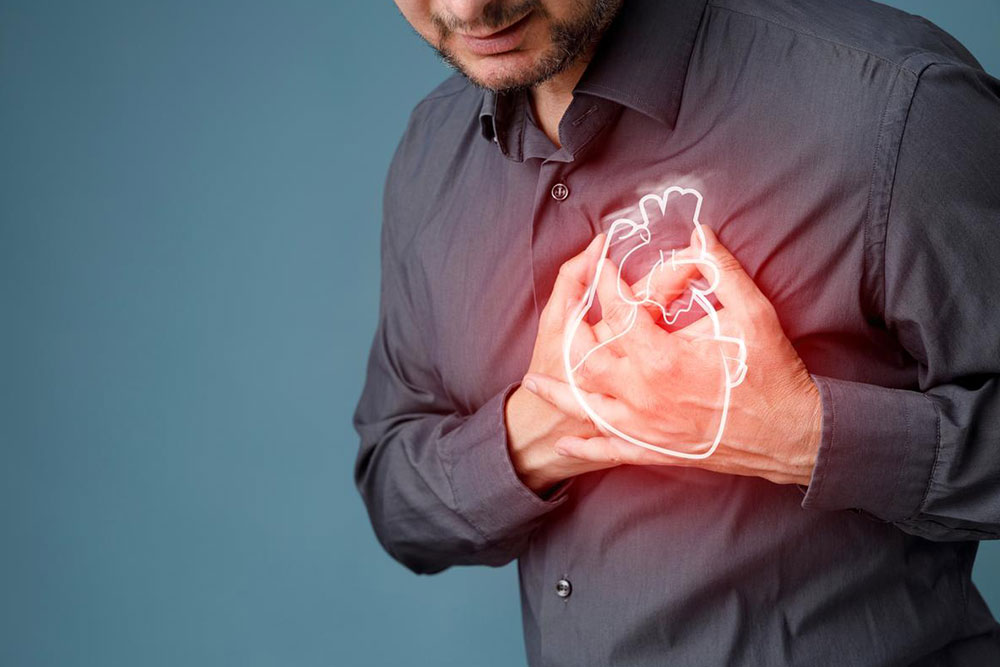Heart diseases, encompassing a wide range of conditions affecting the heart and blood vessels, are a leading cause of mortality worldwide. Modern medicine classifies these into conditions such as coronary artery disease, arrhythmias, heart failure, and valvular diseases. Ayurveda, the traditional Indian system of medicine, refers to heart diseases under the umbrella term Hrudroga, offering a holistic perspective on their etiology, pathogenesis, and treatment.
TYPES OF HEART DISEASES
- Coronary Artery Disease (CAD): Narrowing or blockage of coronary arteries due to plaque build-up.
- Arrhythmias: Abnormal heart rhythms, such as atrial fibrillation or ventricular tachycardia.
- Heart Failure: The heart's inability to pump blood effectively, leading to fluid build-up.
- Valvular Diseases: Malfunctioning of heart valves, such as stenosis or regurgitation.
- Congenital Heart Defects: Structural abnormalities present from birth.
Causes
- Unhealthy diet, sedentary lifestyle, smoking, and alcohol consumption.
- Hypertension, diabetes, obesity, and high cholesterol.
- Genetic predisposition and stress.
Hrudroga (Hrud = heart, Roga = disease) refers to conditions affecting the heart, described extensively in classical Ayurvedic texts like Charaka Samhita and Sushruta Samhita. Ayurveda emphasizes the balance of the three doshas (Vata, Pitta, Kapha) for maintaining cardiac health.
According to Ayurveda, heart diseases are classified based on the predominant dosha imbalance:
1. Vataja Hrudroga:
- Caused by vitiated Vata dosha.
- Symptoms: Dryness, sharp pain in the chest, irregular heartbeat, anxiety, and cold extremities.
2. Pittaja Hrudroga:
- Caused by aggravated Pitta dosha.
- Symptoms: Burning sensation in the chest, sweating, anger, and yellow discoloration.
3. Kaphaja Hrudroga:
- Due to excessive Kapha dosha.
- Symptoms: Heaviness in the chest, lethargy, swelling, and a feeling of congestion.
4. Sannipataja Hrudroga:
- Caused by a combined imbalance of all three doshas.
- Symptoms: Mixed features of Vata, Pitta, and Kapha imbalances.
5. Krimija Hrudroga:
- Due to parasitic or microbial infections affecting the heart.
- Symptoms: Chest pain, palpitations, and loss of appetite.
Symptoms (Lakshana)
- Palpitations, chest discomfort, and irregular heartbeat.
- Weakness, excessive sweating, and shortness of breath.
- Heaviness in the chest and mental restlessness.
Complications of Heart diseases
- Heart Failure: Inability of the heart to pump blood effectively, causing fluid build-up, fatigue, and breathlessness.
- Myocardial Infarction (Heart Attack): Damage to heart muscle due to blocked blood flow, potentially leading to cardiac arrest.
- Arrhythmias: Irregular heart rhythms that may cause palpitations, fainting, or sudden cardiac arrest.
- Stroke: Blood clots from the heart may block brain arteries, causing paralysis or cognitive impairment.
- Cardiogenic Shock: Critical failure of the heart to supply blood, leading to organ failure.
- Pulmonary Hypertension: High blood pressure in lung arteries, progressing to right-sided heart failure.
- Kidney Damage: Poor blood flow to kidneys can cause chronic kidney disease.
- Blood Clots: Clots can cause stroke, pulmonary embolism, or limb ischemia.
- Valve Disorders: Damaged heart valves impair blood flow, worsening heart function.
- Mental Health Issues: Anxiety, depression, and reduced quality of life.
Ayurvedic Management of Hrudroga
Ayurveda aims to balance the doshas, detoxify the body, and rejuvenate cardiac function.
Shodhana (Purification Therapy):
- Vamana (Emesis): Removes Kapha toxins.
- Virechana (Purgation): Eliminates Pitta dosha.
- Basti (Medicated Enema): Balances Vata dosha.
Herbal formulations like Arjuna Ksheerapaka (Terminalia arjuna in milk) for cardiac strength.
Hrudya Rasayanas like Brahmi (Bacopa monnieri), Ashwagandha (Withania somnifera), and Guduchi (Tinospora cordifolia).
Pathya-Apathya (Diet and Lifestyle):
- Recommended Foods: Warm, light meals, whole grains, green leafy vegetables, and fruits like pomegranate.
- Avoid: Fried, processed, and overly salty foods.
- Lifestyle Tips: Regular exercise, yoga (Pranayama), and meditation.
Rasayana Therapy (Rejuvenation):
Use of Medhya Rasayanas like Shankhpushpi (Convolvulus pluricaulis) to enhance mental and cardiac functions.
Specific Therapies:
- Hridaya Basti: Localized oil retention over the cardiac region to improve circulation.
- Nasya: Administration of medicated oils through the nasal passage for stress-related heart conditions.
Incorporating Ayurvedic principles with modern diagnostic and therapeutic approaches can offer a comprehensive strategy for managing and preventing heart diseases. Ayurveda's focus on prevention and lifestyle changes complements the technological advancements in modern cardiology.



